This was the final seminar in the series, "Which Truths Can We Build Upon?" Physics and Theology in Discourse, and it was held entirely in English. In the final discussion, it turned out that language was an issue. I'll come back to it later.

|
|
The seminar's organizer,
Prof. Buchleitner, gives some ultimate instructions to students Jayadevan and Sakhibov. This scene reminds me of the recent European Football Championship when a coach talks to players before they enter the field. |
Their second slide, which showed two of my favorite physicists, Sabine Hassenfelder and Neil deGrasse Tyson, already left me wanting more.
In my home country, everything has to be orderly and defined, so the
students showed us two formulations of science.
Immanuel Kant wrote: "Every doctrine, if it is to be a system, i.e., a whole of knowledge organized according to principles, is called science.
The Federal Administrative Court (Bundesverwaltungsgericht) defined science as everything that, in terms of content and form, is regarded as a serious attempt to ascertain truth.
The subtitle of this seminar was Critique of Scientism. Here is a definition:
The students presented even more subdivisions of scientism but concluded that scientific methods are not the only reliable avenues for obtaining knowledge.
As far as society is concerned, it sometimes has problems with science:
To contradict such a statement opens a new can of worms and goes beyond the scope of this blog.
In the States, some Evangelical parents keep their children out of certain
science classes, afraid that scientific education will lead them to doubt and
ultimately reject their faith.
On the other hand, Neil deGrass Tyson has a strong opinion on science education. But what really shocked me was when Karthik showed the following headline:
In the seminar discussion, somebody raised the question of whether there is
ethics in science. I stood up and declared categorically:
Physics has no moral, but physicists should have one!
Remember
Heisenberg's visit to Copenhagen, where he attempted to convince Niels Bohr to talk to the Allies, not to build
the bomb. The meeting ended in a complete misunderstanding.
In the movie Oppenheimer, the pricks of conscience of the bomb builders are apparent.
Following the energetic intervention of Catholic France on behalf of the
Protestants in 1635 during the Thirty Years' War, the cardinal was reminded of
the Christian virtues of forgiveness and charity. Richelieu responded with the
following astonishing argument: "The interests of a state and religion are
entirely different. The state must pursue Christian goals, but it is a
political collective without an immortal soul and can advocate things not
permitted to an individual Christian. The salvation of man, on the other hand,
is finally realized in the hereafter, so it is not surprising that God wants
the individual to leave vengeance to Him ... But the states have no
continuance after this world; their salvation is now or not at all, i.e., The
Bourbon king fights Habsburg emperor.
Here is another statement by Neil deGrasse Tyson:
I do not share Neil's opinion, as this seminar posed a question that physicists can't answer, but theologians do. My Catholic school catechism from the elementary school in Hövelhof had the answer to, "What are we on earth for?" To love God, to serve him, and thereby go to heaven.
Astrophysicist deGrasse Tyson is an atheist. So the following statement is in
line with his "belief" and research:
I want [upon death] to be buried, just like in the old days, where I
decompose by the action of microorganisms, and I am dined upon by any form
of creeping animal or root system that sees fit to do so.… I will have
recycled at least some of the energy that I have taken from it back to the
universe.
Many foreign students study at German universities; their lingua franca is
English. Holding this course in both languages was only partly successful. In
the general discussion about the seminar, English-speaking students complained
about the sometimes complicated German contexts. Nobody likes to reveal
information beforehand, but I proposed that the slides to be presented be made available on the university's ILIAS platform for study before the lecture.
*








No comments:
Post a Comment